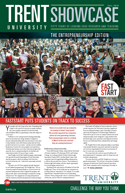
 |
 Defining Our Borders: From Fences to BridgesBorders aren’t just lines on maps—they are national and international policy made real, with all of the issues that such an idea implies. Should borders be a bridge to travel upon, or a way to keep people in (or out)? These questions and more are the basis of Dr. Heather Nicol’s research at Trent. Professor Nicol, a member of Trent’s Geography Department, is a political geographer who studies the political, historic, and economic realities surrounding the Canada-U.S. border, as well as the relationship between Indigenous communities in the North and nation-states. Contesting Canada and contesting borders
Borders are often used to enforce a sense of a singular national identity. However, national borders often don’t reflect the true nature of demographic, economic, and cultural ties. Canada provides many examples of this, as Prof. Nicol notes: “Today, border scholars see the idea of the nation state as quite problematic—there are more connections across international boundary lines than within boundaries, and Canadian provinces may be less connected with each other in terms of flows of goods, information and money than are some provinces with US states.” Prof. Nicol explores this idea of borders being central to Canadian identity in her forthcoming book The Fence and the Bridge. In the book, she discusses how current identity politics and security policy regarding Canada’s borders has been influenced as much by American interests than anything else within Canada itself. Nation-building and the NorthHowever, her investigation of what nation-states really are looks not only across borders, but within them. In particular, she also researches how Canada has defended strict control over Arctic territory under the guise of national identity and nation-building. However, such top-down thinking negates the experience of many people in Canada, particularly Indigenous communities. “We live in what has been called a “post-Westphalian state,” where power is diffuse and people connect globally, which means that we should question who has the agency to speak for the state. This is what some of my work focuses on – the idea that state sovereignty can be contested because it is increasingly indefensible,” she explains. “In arguing this, I support the idea that Indigenous groups have the legitimacy to define and determine who speaks for them and the right to contest state sovereignty where necessary.” This idea of contesting current power structures is one that Prof. Nicol considers important in undergraduate research too. She recommends that students “take time to read critically about the issues, especially as they are presented in news broadcasts and social media.” |

































